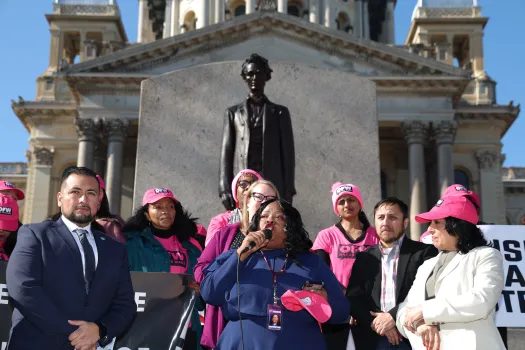Illinois lawmakers are gearing up to reintroduce a legislative proposal that would require employers to pay tipped workers the full state minimum wage. This effort comes amidst growing concerns about wage equity and the financial stability of workers in the service industry.
Under the current law in Illinois, employers are permitted to pay tipped workers a lower base wage as long as their tips bring their total earnings up to the minimum wage. However, this system has been criticized for its potential to create inconsistent and unreliable income for workers. According to WGEM, many tipped employees often struggle to achieve financial stability due to fluctuations in their tips.
Proponents of the new legislative push argue that eliminating the subminimum wage for tipped workers would provide them with a more stable and fair income. Advocates believe that the current tipping system leaves many workers vulnerable to economic hardship, especially in industries where tipping can be unpredictable.
Supporters also point to the broader economic benefits of raising wages for tipped workers. They argue that higher earnings can lead to increased consumer spending, which in turn can stimulate local economies. Ensuring fair wages is seen as a crucial step towards addressing income inequality and improving the overall standard of living for low-wage workers.

The proposal, however, faces significant opposition from business owners and industry representatives. They argue that increasing base wages for tipped workers could impose financial burdens on small and independent businesses. Critics warn that higher labor costs might result in increased prices for consumers, reduced hours for employees, or even layoffs.
Business owners are also concerned about potential changes to the tipping culture. They argue that customers might be less inclined to leave generous tips if they know workers are receiving higher base wages, which could ultimately affect the overall earnings of tipped employees.
Illinois lawmakers are preparing to reintroduce the proposal in the state legislature, with efforts to address the concerns of opponents and build broader support. As reported by WGEM, lawmakers backing the initiative are likely to engage in extensive negotiations and advocacy to garner the necessary votes for passage.
Proponents are hopeful that growing awareness of workers’ rights and economic justice issues will bolster support for the measure. They plan to leverage public opinion and mobilize grassroots efforts to advocate for the legislative change.
Also Read:
- Rockford’s Top Wing Spots: The Best Three According to Locals
- Best Italian Ice in Chicago: Three Must-Try Spots
Conclusion
The renewed push to require employers to pay tipped workers the full minimum wage in Illinois represents a significant step towards wage equity and economic justice. As the legislative process unfolds, the debate will continue to reflect broader conversations about fair compensation, workers’ rights, and the role of policy in shaping labor markets. By addressing the challenges faced by tipped workers and considering the impacts on businesses, Illinois lawmakers aim to create a more balanced and equitable wage system that benefits both employees and the broader economy.




